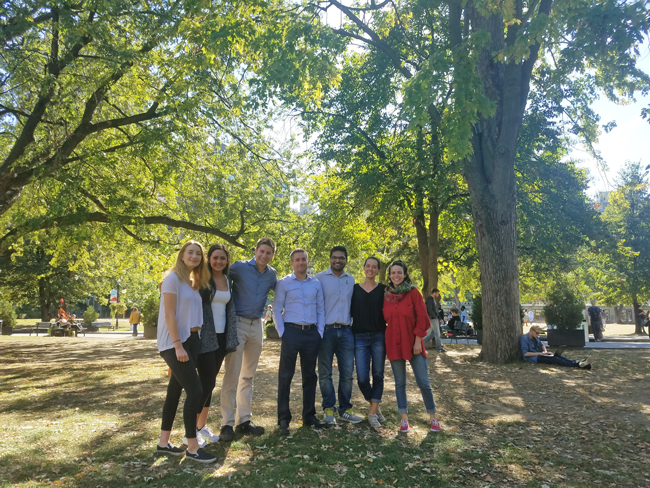
By Antonia Butler
In an effort to become a leader in our community for responsible waste management, McGill is taking steps to reduce the amount of waste generated on campus and increase its diversion rate, in the hopes of one day becoming a Zero Waste Campus.
One particular initiative this summer, lead by Philippe St-Jean, Sustainability Construction Officer at Facilities Management and Ancillary Services, and a group of student volunteers, analyzed the current waste management practices of five specific buildings representative of most buildings on campus – the Brown Building (administration), SSMU (student centre), La Citadelle (residence), McConnell Area (athletics facility) and Trottier (academic).
After months of analyzing and surveying, recommendations to improve waste management practices in these five buildings were put forth. Amanda Starnino, a Master’s student in Bioresource Engineering with concentration in Integrated Water Resource Management, and Aditya Jain, also a Master’s student in Bioresource Engineering, worked together to finalize the recommendations to improve the waste reduction and diversion practices of each building. Once the recommendations have been approved, the team will then take the appropriate actions to implement changes and analyze the results, in the hopes of eventually applying them to all other buildings on campus.
“I worked as part of a team on sustainable waste management practices and strategies to introduce composting on campus. My work was to focus on the current waste management practices in Trottier, La Citadelle, and McConnell Arena and to identify best practices in North America and elsewhere for improving the diversion rate from landfill,” said Jain. “It was both interesting and challenging to identify and consult various stakeholders of the project, especially during the summer months when most of them were on vacation. We, as a team, believe that bringing sustainability initiatives to campus will directly have a positive impact on the students’ lives and help break the conventional silos.”
Another volunteer on the team, Jeff Tétreault, a Sustainability, Science, and Society student, is focusing on the procurement aspect of this project. “My work on the Zero-Waste Project was great. I had the chance to do research to get a better understanding of compostability and the environmental impact of the University’s dishware, cleaning products, and office supplies. I also got in touch with several companies around the Montreal region to find more sustainable products being offered. This allowed me to put several options on the table for McGill’s dishware, cleaning products, and office supplies to be more environmentally sustainable,” he said.
“In the end, I will have had the chance to participate in a project that will help to implement compost in five buildings at McGill with the aim of spreading our achievements to every other building on campus. I look forward to continuing my work throughout the semester along with my colleagues.” Tétreault’s involvement will ensure waste reduction at the source, leading to less waste generated overall and higher diversion rates.
Madeleine Gauthier, a Biology and Anthropology student, and Antonia Butler, an Electrical Engineering student, have been working towards improving composting facilities on campus since last fall, and are proud to be part of this project. “At first, the idea was to purchase an industrial composter for use on campus to allow post-consumption composting of organic waste from as many buildings as possible. After some analysis, we realized that the problem was not just the lack of composting facilities, but also the lack of awareness and concern regarding good waste practices,” said Gauthier.
“Since beginning to work with Philippe and the other volunteers, we have been very conscious of the user. We have had to rethink waste management practices at McGill, including the types of bins we use, the information and signage given, even the number of bins or waste stations in common areas,” said Butler. “Taking a system-wide approach will certainly help to significantly improve our waste divergence for the long term. Having started with an idealistic vision and little knowledge or support for improving waste divergence, it’s exciting to know that our efforts are going to have visible results very soon!”
Christina Rosché, an Environment and Development student, is leading the education and awareness aspect of this project, vital to its success. She has done research to find gaps in the current education around waste management, and taken steps to improve it. This involves things like engaging users to correctly sort their waste and raising awareness around the implications of good waste management, in order to hopefully inspire users to improve their consumption and disposal habits.
Antonia Butler is in her fourth year of Electrical Engineering, focusing on power engineering and renewable energy, and minoring in Economics.

I am so glad to hear that this type of initiative is going on here at McGill. I want to thank those that volunteered in this project. Let us keep the good work up and active.
I think you are all brilliant. It seems so obvious once someone looks at it: That waste must be managed intelligently at a huge place like McGill. And McGill has the cachet to make initiatives like this impactful. This is true collaborative leadership. Good luck, and bravo!
Excellent job to everyone involved. For students interested such as myself, is there a way that we can take part in projects alike? Thanks